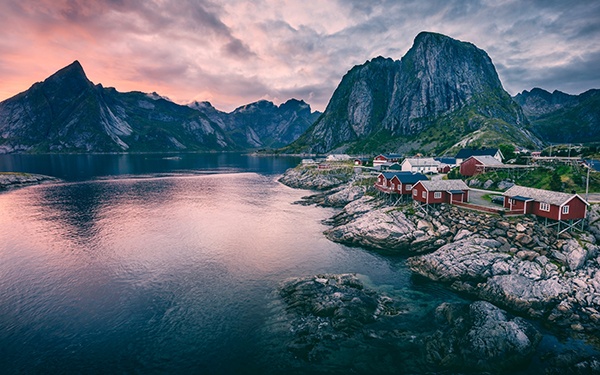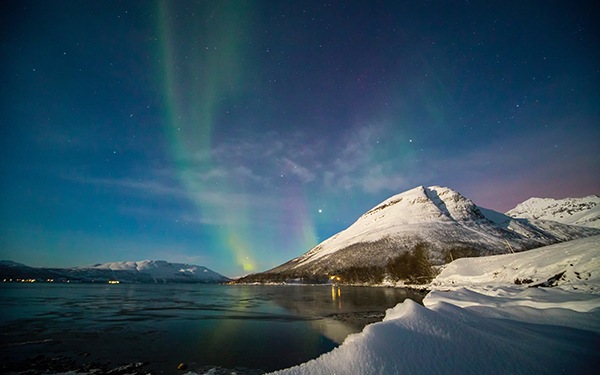Are you considering a move to Norway from the UK?
Topping the list as the best place to live in Europe according to the United Nations — and certainly one of the most beautiful — Norway is known for its extraordinary, jaw dropping landscapes of fjords and glaciers, charmingly pretty villages, diverse wildlife, and the magical spectacle of the Northern Lights.
Norway’s social scene is vibrant and the economy is thriving, making it a fantastic place to live for British expats who don’t mind the dark, harsh winters.
Read on to discover everything you need to know if you’re thinking of relocating to the Land of the Midnight Sun…
Contents
Norway Visa Requirements for Brits
As things currently stand Britain is still part of the European Union, and like Norway, the European Economic Area (EEA), so the following visa rules apply.
In the event of a no deal Brexit, Norway has reached an agreement with the UK that will safeguard citizens’ rights in a no-deal scenario. This agreement ensures the right to work and reside for British citizens and their family members who are already entitled to reside and work in Norway as of exit day.
The situation for UK citizens relocating to Norway after exit day remains unclear, but as there are close ties between Norway and the UK, things remain hopeful.
Visiting
At the moment no visa is required for UK citizens visiting Norway for up to 3 months.
Working
UK citizens can enter Norway on a visitor’s visa to look for work, but once work is found or if staying for longer than 90 days to look for work (job seekers are permitted to stay for up to 180 days in order to find employment) they must register with the Norwegian Directorate of Immigration (UDI).
In the case of a no deal Brexit, Brits who want to work in Norway or to stay for longer than 90 days will need to apply for a residence permit before they can legally do so.
Permanent Residency
To apply for permanent residency in Norway you must have held a residence permit in Norway for at least three years.
Permanent residency entitles you to stay and work in Norway indefinitely, and once you receive your permanent residence permit, you will be issued a residence card that is valid for two years at a time.
After 7 years continuous residence it is possible to apply for Norwegian citizenship.
Way of Life in Norway
Lifestyle
The standard of living in Norway is high.
Norwegians love nature and mostly lead a healthy, outdoor lifestyle, so if you like to spend your time hiking, camping, cycling, cross country skiing, fishing, whale watching and other outdoor pursuits, you are sure to love living in Norway.
The Norwegian people may initially come across as a little brusque, but this is simply because they take a little time to open up to new people, and Norway is actually a very warm and welcoming nation, with the majority of people being English speakers — although it is still recommended to learn Norwegian if you plan on living here.
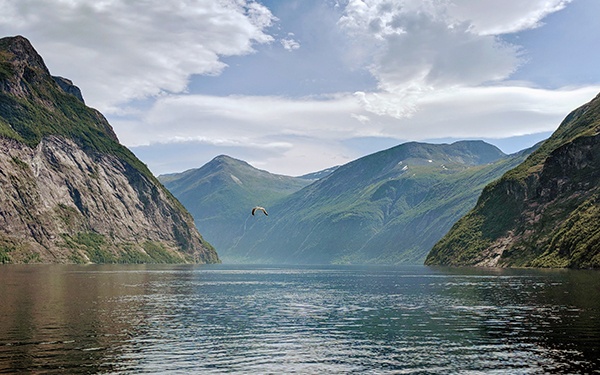
Work and study are taken seriously and Norwegians work hard, but also make the most of their evenings, weekends and holidays, filling them with cultural activities, socialising, outdoor activities, or just relaxing with a good book in front of the fireplace.
There’s a significant café culture here, and drinking coffee together is a favourite way to catch up with family and friends.
Norwegian cities are cosmopolitan and exciting, with lots of arts and culture to discover, electric nightlife, and a wide range of Norwegian and international restaurants.
The country’s traditional cuisine consists of dishes made from local ingredients, so expect to see a lot of seafood dishes, boiled potatoes, and hearty meat stews.
Contemporary Norwegian cuisine is having a moment right now, with up and coming chefs taking a fresh approach to local ingredients – particularly seafood delicacies.
Getting Around
As you would expect from such a forward thinking country, Norway’s public transport system is extremely efficient, and the various forms of public transport often have coinciding arrival and departure times work to provide seamless connections.
Norway is served by more than 50 airports, and travelling by air is a convenient way to cover longer distances between major cities and smaller regional airports. When booked in advance, it need cost no more than the equivalent journey by train. There are three flight operators offering domestic flights in Norway — budget airline Norwegian, SAS Scandinavian Airlines, and Widerøe. It is advisable to book well in advance if you want to get the best deals.
A popular way to travel both locally and long distance is to take the bus. Buses are comfortable and services are punctual, and are often the only form of public transport in more remote areas. Nor-Way Bussekspress has the most extensive bus network, and times its bus timetables to link with train and ferry schedules.
Nearly all train services in Norway are state run by NSB, and offer convenient and comfortable standard and ‘komfort’ class tickets for travel between the bigger cities, but lines don’t extend further out into smaller towns and more remote areas.
Tickets are affordable, especially if you book online in advance and manage to get hold of a minipris ticket, and for multiple journeys it’s worth investing in a Eurail Norway pass to benefit from extra savings.
Ferries also play an essential role in Norway’s public transport infrastructure, giving access to the islands and coastal towns and villages, as well as offering the chance to soak up some of that awe inspiring fjord scenery.
Services include car ferries, lake steamers, and express boats, and in the southern region of Telemark ferries also operate to cover the substantial canal network.
In towns and cities there are local bus services and taxis, although taxis tend to be very expensive — particularly at peak times and on weekends.
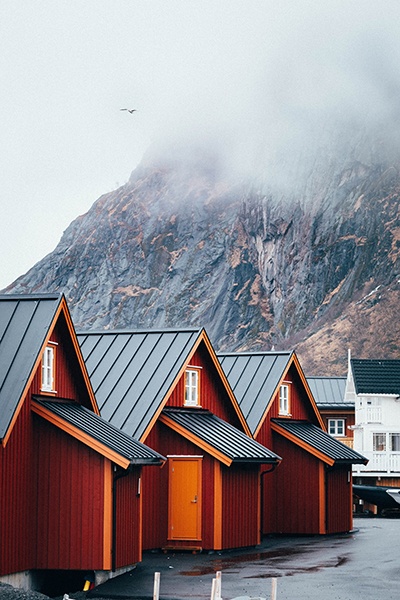
Driving in Norway
Driving in Norway is a great way to visit more inaccessible areas under your own steam.
The quality of the main roads is excellent, although there are still some slightly treacherous areas including long tunnels, and narrow mountain roads which are too dangerous to be used during winter.
The minimum age for renting a car in Norway is 21, and there are plenty of major car rental companies, most of which require that you have at least one year’s driving experience and either an International Driving Permit or EU/EEA license.
There are a wealth of beautiful scenic routes to travel, but be prepared in case of an emergency and fill up with fuel whenever you can as petrol stations can be hard to find in certain areas.
Weather in Norway
Norway’s climate is as diverse as its scenery. In the north the winters are especially long and cold, with temperatures down to as much as -40°C.
The months of December, January, and February are very dark, and in some northern areas the sun doesn’t rise at all, although this does offer the opportunity to see the spectacular natural displays of the northern lights.
Much of Norway is covered in snow in the winter, making it the ideal time to enjoy skiing and other winter sports and activities.
Southern and coastal areas are much milder than the north during winter, with temperatures hovering at around 0°C. From march to may, springtime is when the days start to grow longer and the snow gradually melts.
The weather can be pretty haphazard in Norway at this time of year. Summer heralds the longest days — and in the north the midnight sun — and temperatures can reach up to 25°C to 30°C, with inland areas being hottest, as well as the eastern side of the southern mountains and the south coast.
September is the beginning of autumn, and the air starts to take on a chill, with temperatures remaining highest along the coast. Days are often rainy or foggy but with spells of sunshine that illuminate the beautiful natural displays of autumn colour.
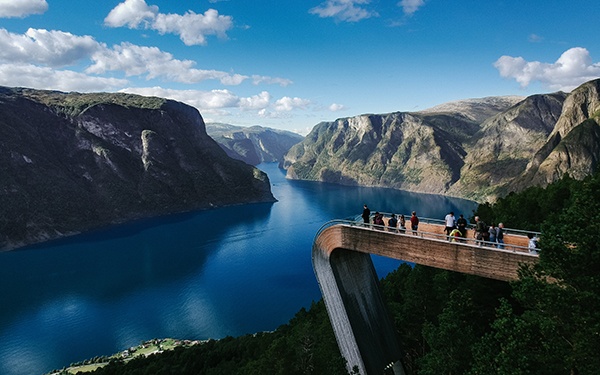
Cost of Living in Norway
Lifestyle
There’s no getting away from it, the cost of living in Norway is high — the capital city of Oslo is one of the most expensive cities to live in Europe. However all is not as it first appears.
Higher salaries for expats working here usually offset the expense of day to day living, and once you’re earning and spending in Norwegian kroner you won’t suffer from crippling exchange rates.
That said, UK expats living in Norway can expect to pay high prices for groceries as they are subject to 12% VAT. Avoid expensive imported goods and opt for more affordable local produce, or shop in one of the increasing number of budget supermarkets. Duty on alcohol is extremely high — particularly for spirits.
Costs for dining out vary wildly depending on the restaurant, but there are more inexpensive options available.
Public transport is reliable and relatively affordable, whereas driving a car can be very costly. Utilities are also a little on the pricey side, and heating bills can take a huge hike in the winter months.
Take a look at this video on the cost of living in Norway:
Rent
Rental prices in Norway are high — particularly in Oslo — but away from the city centres in the suburbs there are more reasonably priced options.
A one bedroom apartment can cost anything from 7500 kr to 12500 kr or more depending on how close to a city centre you are.
For family sized accommodation, expect to pay roughly between12,500 and 20,000 kr. That said, the quality of rental accommodation is to a very high standard.
On average Norwegian households usually spend around 31% of their total annual expenditure on rental costs and utilities.
Healthcare
Norwegian taxes may be high, but they do go towards funding the excellent government subsidised public healthcare system.
The standard of medical care in Norway is top notch, and prescription drugs are nearly always free of charge or available at low cost.
However expats living in Norway will have to pay for doctor or hospital visits, but once they reach they annual limit of healthcare expenditure of just over 2,000kr, they are entitled to an exemption card (frikort) and will not have to pay any more within that calendar year.
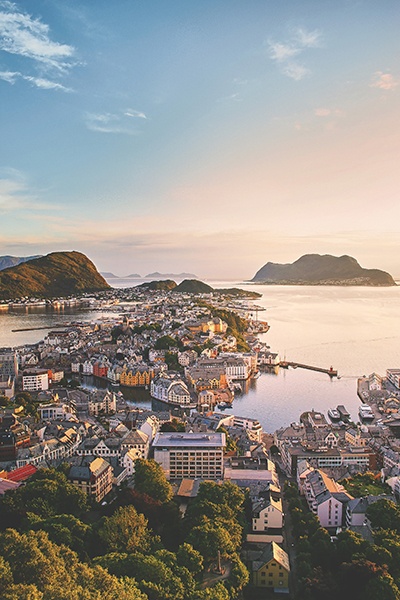
Schooling
The education system in Norway is also free of charge, and to an outstanding standard.
Many Brits living in Norway take advantage of this, while others prefer to send their children to an international school as lessons in Norwegian schools are taught in Norwegian — although with English as a mandatory second language.
International school fees can be extremely expensive and limited spaces are available.
Popular Areas for Brits
Oslo
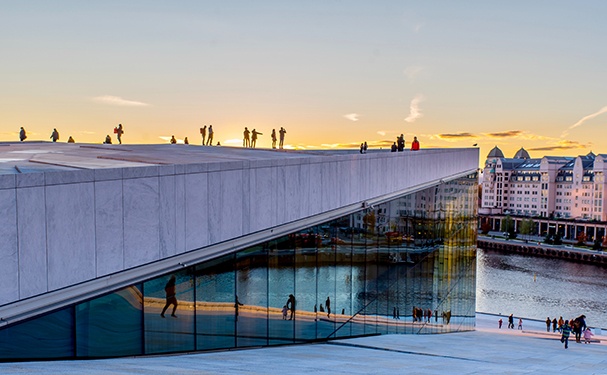
One of the world’s greenest cities, Oslo is perfectly placed between mountains and the sea, with city parks everywhere you look.
There is some incredible architecture to admire too, as well as great museums and a hot contemporary arts scene.
Oslo nightlife is vibrant and fun, with countless live music venues and hip nightclubs and bars, and Oslo’s recent culinary explosion has given rise to some fabulous world class cuisine.
Trondheim
This former Viking capital is surrounded by forested hills and is threaded through with pretty waterways.
The city features a glorious old town complete with Gothic cathedral, and there are plenty of museums, cafés, restaurants and bars to explore.
Trondheim also has a proud musical heritage — particularly for heavy metal and classical music — and there are two museums dedicated to this part of Norwegian history.
Tromso
Northern Norway’s largest city, Tromso is situated on an island just off the north coast amidst spectacular fjords and snow dusted mountains.
It’s home to one of Norway’s major universities, and there’s a youthful spirit about the place with fantastic nightlife, an overwhelming number of pubs, and cultural events and festivals all throughout the year.
Tromso is also far enough north to be able to admire the northern lights in all their glory at certain times of the year.
Bergen
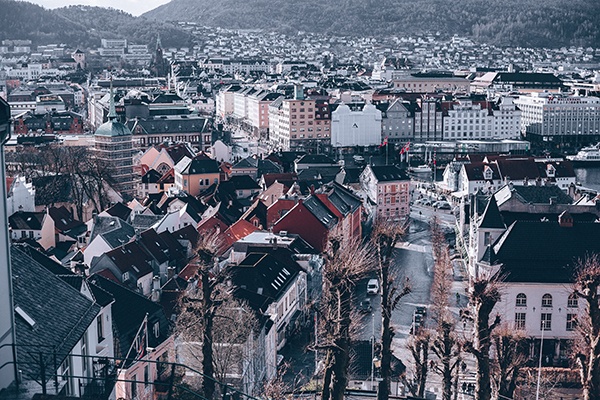
This charming coastal city hugs Norway’s western shoreline, and is the perfect base for exploring the very best of the Norwegian fjords and the surrounding mountains.
Beautiful old wooden trading buildings with colourful façades are a major attraction here, and there are also a large number of art galleries and boutiques lining the winding streets.
The seafood here is some of the best in the country, and there is a lively bar and club scene thanks to the large student population to help keep things fresh and exciting.
Arendal
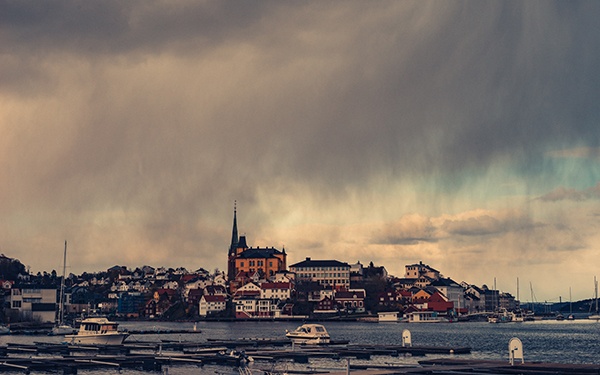
With a summer calendar of events full to bursting, a pleasant climate and friendly small town feel, live music, and open air bars,
Arendal has something to keep everyone entertained.
Explore the pretty old town with its wooden beamed buildings, or take a boat to one of the many islands making up the archipelago or laze on the beach.
Alesund
Alesund is a fairytale town poised on a group of islands in Norway’s far north.
It boasts some exceptional examples of art nouveau architecture complete with turrets and carvings, plus a lively port and an attractive waterfront.
Enjoy strolling the streets or feast on fresh fish in one of the town’s many superb seafood restaurants.
Jobs in Norway for British Expats
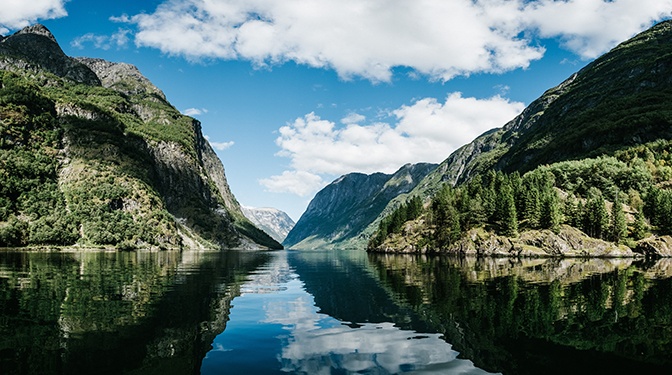
Finding employment as an expat in Norway can be challenging.
Many Norwegians are highly educated, and though Norway’s economy offers up plenty of scope for jobs, competition for skilled work is tough.
Speaking Norwegian is definitely a huge advantage to finding work here, as because most Norwegians speak English, being a native English speaker is not really an advantage — however working as an English teacher is a popular job for British expats living in Norway.
Norway does have certain sectors with a skills shortage, including ICT, construction, and healthcare, and the energy and petroleum industries also remains a major employer.
Jobs in the service sector such as catering and working in restaurants, hotels and bars are also a common form of employment for British expats.
Still considering moving to Norway from the UK?

